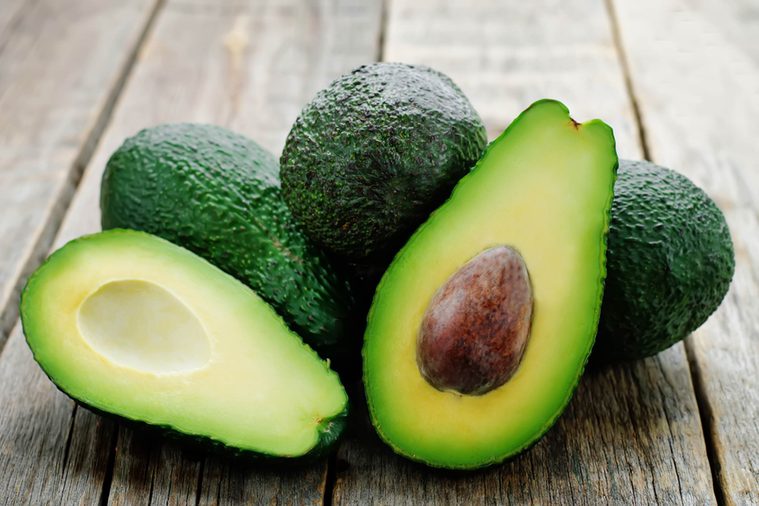Yes, Diet Avocados Are a Thing—and They’re Driving Dietitians Crazy
Updated: Mar. 04, 2021
Before you reach for that diet avocado, here are the facts.
 As avid alligator pear enthusiasts, we were shocked to discover that “diet avocados” exist. (How could you make something “diet” or “light” if it’s already perfect the way it is?) Apparently, the concept of “diet avocados” has been around for quite some time—85 years to be exact, according to the SlimCado website. The surprising part? They’re produced naturally without any GMOs. (Did you know the word “avocado” has a dirty origin?)
As avid alligator pear enthusiasts, we were shocked to discover that “diet avocados” exist. (How could you make something “diet” or “light” if it’s already perfect the way it is?) Apparently, the concept of “diet avocados” has been around for quite some time—85 years to be exact, according to the SlimCado website. The surprising part? They’re produced naturally without any GMOs. (Did you know the word “avocado” has a dirty origin?)
“SlimCados naturally have up to half the fat and a third fewer calories than the leading California avocado,” according to the SlimCado website. So how the heck do you create an avocado with less fat without genetically modifying it? As it turns out, it’s easier than you’d think.
According to Mary Ostlund, marketing director at Brooks Tropicals, the creators of the SlimCado, “There are many different varieties of avocados just like there are many varieties of apples and many varieties of grapes. Most of the greenskin varieties grown in Florida naturally have less fat than the Hass variety grown in California and Mexico. At Brooks Tropicals we market a group of these green skin varieties as ‘SlimCados.’ We have been growing many of these varieties for almost a century, but only realized their health benefits in recent years.” (By the way, did you know the healthiest part of the avocado is in your garbage?)
In other words, these “diet avocados” are actually called Florida (or greenskin) avocados. According to avoseedo.com, “One cup of Florida avocado has 276 calories and 23 grams of fat. One cup of Hass avocado has 384 calories and 35 grams of fat.” However, while having fewer calories and fat may sound more beneficial, the fat that’s found in Hass avocados is actually great for your heart and your skin. In turn, the concept of “diet” avocados having less fat has sparked controversy among dietitians and avocado-lovers across the nation.
“Not only [are Hass avocados] high in fiber, but [their] precious oil is loaded with monounsaturated fats. Monounsaturated fats lower bad cholesterol and raise the good cholesterol in the body, so why would anyone want to eat a low-fat avocado?”says Dr. Elizabeth Trattner A.P. DOM, doctor of Chinese and Integrative Medicine.
“I’m a registered dietitian nutritionist and the idea of diet avocados makes me crazy!” Kristie LeBeau, MPH, RN, RDN, told Reader’s Digest. “Healthy fat helps you absorb fat soluble vitamins like vitamin A, D, E, and K. Plus, avocados have fiber, potassium, and vitamins B and E so they are a source of nutrition on their own.”
Not to mention, Hass avocados tend to be much tastier and richer than Florida avocados. Florida avocados have a more “buttery” taste than Hass avocados. (Fun fact: According to Brooks Tropicals’ website, “SlimCado varies in shape and in size from three to thirteen inches long and up to five inches wide.”)
So, if Florida avocados aren’t as tasty as other avocados, when should you be choosing that variety over the others? “The Florida avocado may be superior in just a few cases—namely, when slicing and dicing for salads,” according to avoseedo.com. “The firm, low-fat flesh holds its shape when you toss cubes of it into a salad, for example. And if you are adding olive oil, nuts, or other healthy fats, perhaps you might be interested in cutting calories by using the Florida variety instead of the Hass…It’s easy to slice and handle, but has a watery taste compared to the Hass.”
So, should we be switching? According to Ryan Frankel, Founder of EduPlated, probably not. “By sticking to 1/2 portion of an avocado a day, you’re able to enjoy [its] healthy fat within the fat intake for the day,” says Frankel. “In addition to the healthy fats, regular avocados provide ample antioxidants, which have been linked to weight management and fighting inflammation. Regular avocados should be deemed nutrient powerhouses as they include key nutrients such as vitamin E, K, magnesium and potassium and fat-soluble vitamins, which help transport fat from the digestive system into the bloodstream.”
Need more convincing? Here are some more benefits of avocados you should know about.